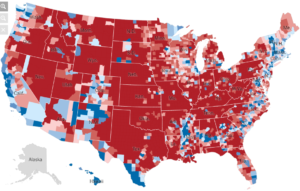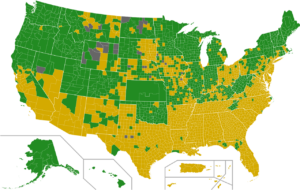Hillary Clinton and Neo-Liberalism Abandoned the Working Class
Based on the past 100 years of political history, the Democratic Party has represented working class Americans. This is the party of FDR’s “New Deal” and the party of organized labor. People who believe that private corporations can do more damage than the federal government are Democrats. So why, then, does it appear that a large number of members of major labor unions and the white working class have abandoned the Democratic Party?
This is the question that supporters of Hillary Clinton, operatives at the DNC and pollsters have been trying to answer since the 2016 election results started to roll in. Unfortunately, it is the wrong question. The correct question is “how have the principals of the Democratic Party changed in the last 20 years to push their working class constituents away”?
First, let’s investigate the places where Hillary Clinton lost the election. In a county by county review, Hillary lost the Bernie vote. The counties that went to Bernie Sanders in the primaries by the largest margins seem to have shifted to Trump in the general election. This isn’t the “fault” of Sanders for running an aggressive primary campaign. It is the fault of the Clinton campaign and the DNC who failed to read the tea leaves about what the election of 2016 was about. Let’s go to the maps and see what those “tea leaves” would have revealed.

United States 2016 Presidential election results, by county.

Bernie Sanders 2016 primary election map by county (Green indicates a Sanders win).
The above maps illustrate the results of the United States 2016 Presidential election by county (left) and Bernie Sanders 2016 victories by county (right). Note the direct correlation between the counties where Sanders achieved overwhelming wins over Hillary Clinton and those that shifted to support the election of Republican Donald Trump. Looking specifically at the states of Michigan and Wisconsin, the states that Donald Trump the Presidency, you will notice solid green on the Sanders primary map. These states overwhelmingly voted against Hillary Clinton. Did the voters in these counties suddenly give up their Democratic principals? Unlikely.
What is more likely is that this was an election about traditional Democratic economic values, featuring a Democratic nominee who did not campaign on those values. Democratic voters did speak in their primary votes about the issues that concerned them most. These working class voters felt left behind in the economic recovery in the Obama years and they have watched as their towns and counties slowly withered away as their jobs were shipped overseas to countries that do not require the same wages required in the United States of America. To reinforce this, we should review Bernie Sanders platform:
- Anti-Free Trade – Bernie campaigned on an anti NAFTA, anti TPP platform as traditional populist Democrats would have in the 70’s or 80’s.
- Jobs and Wages – Bernie campaigned on bringing jobs back to the Midwest, strong American manufacturing and higher minimum wages
- Fixing Healthcare – Bernie campaigned on fixing Obamacare by adding a single-payer option, which did not make it into the original ACA law
- Respect and Dignity – Bernie emphasized “respect and dignity” for middle class American workers and their right to quality of life
Do any of those themes sound familiar? How does Make America Great Again sound? That’s right – because the Republicans pushed Donald Trump so far away from the party mainstream, he was able to co-opt the populist working class friendly Democratic message and mix it with Republican economic policy. He didn’t care that mainstream Republicans would revolt because he correctly understood why Bernie was drawing massive crowds throughout middle America. Now, this is not to say that Trump’s “solution” to any of the above problems is remotely close to the solutions that Sanders had proposed. The point is that Trump addressed these issues and Hillary did not.
Hillary’s message to working class voters was almost antithetic to Bernie’s messaging. She wanted voters to believe that America is strong, that the Affordable Care Act did not need ongoing adjustments to achieve its lofty goals, and that the Obama economy had truly created millions of jobs for any American who wanted them. The challenge here is that those statements are only true in urban America. Travel across the country and visit some of the counties that backed Bernie and then flipped to Trump and you will see virtual economic devastation. These aren’t, for the most part, deplorable people who are too stupid to realize that they voted against their interests. These are people who saw in Hillary Clinton a candidate making rosy statements that did not fit the facts that they saw when looking out of their living room window.

Supporters of republican presidential candidate Donald Trump attend a campaign rally at the Myrtle Beach Sports Center on Feb. 19, 2016 in Myrtle Beach, S.C. (Olivier Douliery/TNS)
Going back to the nomination process, for anyone who watched the DNC and RNC conventions, there was a stark role reversal in the messaging and attendees. The Democratic convention featured a sea of red, white and blue and seats filled with top academics and millionaires. The message was that America was strong, our military is mighty and the economy is good. Flip to the Republican convention, and the message was that the country is in disarray and that jobs are fleeing the border. How do you think people outside of the urban core, who saw a jobless recovery might respond to that. Do I need to answer that question? Probably not.
We have all, at this point, had the opportunity to see the Wikileaks e-mails in which it was revealed the that DNC clearly had a preference for Hillary Clinton as a candidate over Bernie Sanders. Instead of listening to working class voters, they became so internally frothy and excited about their neo-liberal standard bearer that nobody bothered to worry about whether she could win. Nobody bothered to question if the messaging was right, given the ascent of Bernie Sanders in the primary. Arrogance had many names in 2016. Just look at Debbie Wasserman Schultz, who believed that she could appoint the Democratic nominee and the entire Clinton campaign, who, while data driven, decided to disregard the data that didn’t support their positions – something that Republicans are often accused of doing.
The lesson here is that Democratic values are alive and well. In 2016, however, an arrogant Democratic party that was out of touch with the issues of the electorate had those issues co-opted; and with Donald Trump in the White House for the next four years, it is unclear if they will have an opportunity to correct these errors before Obama’s legacy is erased.


